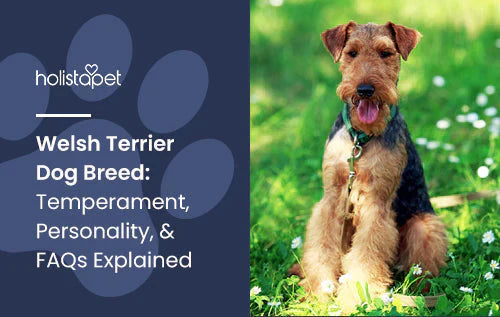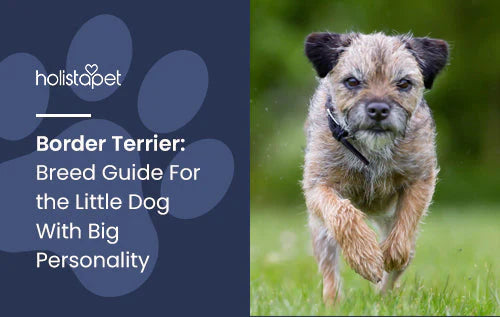The Welsh Terrier is usually the life of the party. They are energetic dogs that love to hunt down vermin, play with other dogs, and run around with the family. Rumored to be the United Kingdom's oldest modern dog breed, Welshies look remarkably similar to the Airedale Terrier.
This resemblance came about because many Terrier breeds, including the Welsh Terrier, share a common ancestor: the Old English Black and Tan Terrier. Nowadays, these former working dogs are primarily bred to be show dogs, and they're one of the best pets available for dog lovers.
Welsh Terrier Dog Breed Characteristics
This breed's extroverted personality complements its welcoming face. The Welsh Terrier features wide-set eyes on a flat skull, giving it an intelligent expression.
Its long legs are perfect for digging, so be sure to check your yard occasionally for any escape tunnels! The average life span of a Welshie is 12-15 years, and they only come in one color: black and tan.
Welsh Terrier Dog Breed Size
Similar to many dogs in the Terrier group, Welshies are traditionally small or medium size. They were bred for hunting small pests around houses or barns, so their size helped them fit inside small spaces.
Male Welsh Terriers often stand 15 inches as adults, while females generally reach 14 or 15 inches. Either gender can weigh up to 20 pounds. Though, the average female Welsh Terrier is usually smaller than the typical male.
Welsh Terrier Dog Breed Personality
The Terrier family is defined by their energetic, feisty attitude, and Welsh Terriers are no exception. They are confrontational dogs who may seek out arguments with other animals.
This behavior may require some extra training to extinguish, but it is entirely normal for Welshies. After all, they were bred to fight badgers, otters, and other potential threats, so they're only doing what comes naturally.
These dogs may sometimes put on their famous "stink eye" (a furrowed brow that causes the face to appear angry). This expression is usually a sign of mild annoyance or independent thinking rather than aggression. In fact, the Welsh Terrier Rescue Service's yearly fundraiser, the Stink Eye Walk, is named after the look.
Welsh Terrier Dog Exercise
Most terriers have plenty of energy to spare. They have a high prey drive, which means they will chase a varmint for much longer than the average dog. The tenacity and stamina of these protective Welsh Terriers mean they require consistent exercise.
Generally, terriers appreciate as much playtime as possible. You should make sure these dogs get a minimum of 30 minutes of exercise every day. Take your Welsh Terrier for a walk, a game of fetch, or just let them run around a fenced yard to stretch their legs and get their blood pumping.

Welsh Terrier Dog Breed Training
The Welsh Terrier is a social butterfly, but it can also be combative occasionally. Polite behavior must be reinforced early on, so socialization training is important from the dog's early years.
A love of fun means this breed is excellent for the family, but it also means they can get bored easily. Terriers are known for having a mind of their own, and they may try to test their limits during training.
Keeping training engaging and nonrepetitive to help keep the attention of a Welsh Terrier. Additionally, try breaking training up with games or activities so that sessions stay fun and productive.
Welsh Terrier Dog Breed History
The early origins of the Welsh Terrier are fuzzy, but we can clearly trace the roots of this breed back to 18th century northern Wales. Many believe that Welshies are just miniaturized versions of the Airedale Terrier, but the Welsh breed actually came first.
Welshies are the direct descendants of the Old English Black and Tan Terrier that was excellent at hunting games. In fact, many believe that the Old English Black and Tan dog is the forefather of all modern Fell Terriers. "Fell" refers to the hilly country of northern England that bred many small hunting dogs.
Black and Tan Terriers kept houses and farms free of animals like rats and badgers. Their bravery and alertness also made them well-suited for home security.
This responsibility is why many Welsh Terriers today are independent hunters and free thinkers. They may occasionally be stubborn, but rest assured that pesky backyard critters will meet a professional security system.
Welsh Terriers were introduced to the United States in 1888, though their presence in the country was not fully established for about 13 years. By 1901, however, these terriers saw their popularity steadily increasing.
In fact, Jackie Kennedy gifted a Welsh Terrier to her husband, and it quickly became one of JFK's favorite pets. The couple would discreetly walk the streets of Washington D.C. late at night with their terrier, Charlie.

Welsh Terrier Dog Breed Health Problems
Welsh Terriers are generally sturdy dogs that are not prone to developing many health issues throughout their life span. Many ailments that trouble this breed are congenital, and it is the responsibility of breeders to screen their canines for conditions like allergies, hip dysplasia, and Legge-Calve-Perthes disease.
No dog is completely immune, so let's examine some possible health problems a Welsh Terrier may experience and how to best identify and treat the issues.
Atopic Dermatitis
Welsh Terriers can suffer from a skin disease called canine atopic dermatitis (AD), also known as eczema. AD causes itchiness and is often triggered by the animal inhaling or ingesting an allergen. This disease is usually associated with flea and food allergies.
Signs generally appear in dogs between the ages of 6 months and 3 years old. An affected Terrier may have redness or bumps on their skin, especially if it is an area not covered by their fur.
Some dogs are more genetically prone to AD than others, but there are still steps that you can take to reduce the number of allergens in your house:
- Be sure to invest in good flea control and hypoallergenic shampoos.
- Frequent baths will help your Welsh Terrier immensely while also keeping them pretty.
- If AD does break out, use vet-approved antimicrobial agents on your pet.
Hip Dysplasia
Hip dysplasia refers to abnormal hip joint development, and it typically affects highly active dogs like the Welsh Terrier. This condition usually begins with a loose joint that progressively degenerates. A canine with hip dysplasia may show decreased activity, stiffness, a loss of thigh muscle mass, or a "hopping" walk.
Unfortunately, hip dysplasia is a genetic deformity. However, appropriate exercise can lessen the severity of the condition. Nutrition also plays a big role in the development of hip dysplasia, and an owner should buy dog food high in omega 3 fatty acids, calcium, iron and vitamin C, glucosamine, and chondroitin.
Options for treatment include weight reduction, physical therapy, joint fluid modifiers, anti-inflammatory medications, and joint-promoting supplements.
Legg-Calve-Perthes Disease
Also referred to as LCPD, this disease is more common in miniature and toy breeds (under 20 pounds) than in larger dogs. Unfortunately, it also affects many Terrier breeds. LCPD causes the head of the femur to degenerate, eventually leading to hip collapse and arthritis.
Medical professionals are not sure what causes the disease. An affected dog will limp on one of their hind legs - it is rare for both hips to be affected. Limping, pain and lameness are all symptoms of LCPD. A veterinarian can diagnose this disease by using x-rays.
Mild cases of Legg-Calve-Perthes can be treated with physical therapy and pain medication so that your Welsh Terrier can walk more easily. In instances of severe LCPD, surgery may be necessary.
Allergy-Related Digestive Issues
Several dog breeds are prone to allergies, and an allergic food reaction could be the reason for your Welsh Terriers upset stomach. However, many things can cause poor digestion, so be sure you're paying attention to all aspects of your dog's life if they start having problems.
Itchy skin, repeated ear infections, and chronic vomiting or diarrhea are all symptoms of an allergic reaction to something your Terrier has eaten. If you see your Welsh Terrier incessantly rubbing their nice black and tan coat raw or pawing at their ears, you may need to change their diet.
If symptoms persist after you introduce a new food, take your Terrier to the veterinarian. The vet can prescribe a specific brand to your pet so they can eat their food without any adverse reactions.

How to Care for a Welsh Terrier Dog Breed
The Terrier breed does not need elaborate care to be a happy dog. It's true that a puppy Welsh Terrier requires appropriate socialization training to discourage confrontational behavior. Still, these loving dogs don't need much more than healthy food, adequate exercise, and proper grooming.
Nutrition and Feeding for Welsh Terrier Dog Breed
A Welsh Terrier should be fed 3/4 to 1 cup of high-quality dry dog food — split between two meals — every day. However, with every single dog food brand claiming to have "high-quality dry food," it can be hard to know whether your Welsh Terrier will actually get all of the nutrients it needs from the food you buy.
Be sure to get a kibble brand that complies with the nutritional standards of the Association of American Feed Control Officials (AAFCO). You should not give any dog food that does not adhere to these regulations to your Welsh Terrier. Check the product's website or packaging to see if they comply with AAFCO standards.
Your Welsh Terrier should eat food that mostly contains meat. Modern domesticated canines are descendants of wolves, and even though they are occasionally considered omnivores nowadays, their digestive system still favors a carnivorous appetite.
Check to see what stage of life the dog food is made for. As a general guideline, puppy kibble helps growth, while adult dog food maintains health. Some kibble geared towards puppies is higher in amino acids, which helps tissue growth, and adult Welsh Terriers may not need these compounds.
When you're shopping for dog food, keep in mind that puppies should get 22.5% of their calories from protein. Adults only need 18% of their calories from protein. Alternatively, all-stage dog food caters to the average nutritional requirements of a dog at any point in their life. Ask a veterinarian which type of food is best for your specific dog.
Coat Color and Grooming
The Welsh Terrier has two coats: a hard, wiry, black, and tan outercoat and a soft, short undercoat. Welshies do not shed as much as some other dog breeds, but they still require attentive grooming. An owner can either clip their dog or manually strip their coat of any loose or dead hair.
Either way, your pet should be brushed weekly and either clipped or stripped of dead hair every 8-12 weeks. In the wintertime, your Welsh Terrier will appreciate a little more length to their coats.
Trim your dog's nails once a week, and brush their teeth 2-3 times a week. If you'd really like to cut down on tartar and bacteria buildup in your pet's teeth and gums, consider cleaning their teeth daily. Check the dog's ears weekly for infection.
Signs of an infection include redness or a bad smell coming from the ear canal. When cleaning the canine's ears, do not insert anything into the ear canal. Only clean the outer ear, using a veterinarian-approved cleaning solution and cotton balls or gauze.
Every month, take some time to check your Welsh Terrier for sores, rashes, or signs of infection. You should report any redness, tenderness, or skin inflammation to a veterinarian immediately. This will increase the chance you'll catch a potential health problem early.

Children And Other Pets
If you're wondering whether the Welsh Terrier makes for a good family dog, the answer is most definitely yes! The Welsh Terrier's high energy level makes them great for children, and they are incredibly loving to their families.
The Welsh Terrier breed has the charm and size of a lapdog. However, these pets are generally not ones to sit still for very long. This makes them well-suited to another creature that also has high energy and a love of digging holes: children.
This is one dog breed that won't easily tire when the kids want to play. Their protective nature may not be enough to make them certified babysitters, but a stray badger or otter will think twice before going after the family with a Welsh Terrier.
When it comes to other pets, Terrier breeds are known for their extroverted attitudes. They are also known for their stubbornness and tendency to hunt down smaller animals. Teaching your Welsh Terrier to properly socialize is vital. If you're unsure whether your Welshie will get along with another animal, try keeping them both leashed when they first meet.
Let your Terrier get comfortable around the presence of the other animal. Allow them to go at their own pace. If your dog takes well to the other pet, let the pair explore together or play in an enclosed area. If things turn hostile, your dog may simply not like that other animal, or they might need a little more practice on their first impressions.
Rescue Groups
It is generally inadvisable to get a Welsh Terrier puppy from a mill or pet store. Many are currently without homes and eager to be adopted. Many rescue groups operate locally and pull Terriers that are scheduled to be put down from nearby shelters.
The American Kennel Club (AKC) also has over 450 Rescue Network groups across the United States. Click here to search their database and get a hold of a rescue group near you. The official AKC Terrier rescue group is WTCARES (Welsh Terrier Club of America Rescue), a committee of the Welsh Terrier Club of America.
Perhaps adoption, for any number of reasons, is not an option for you. Buying directly from a breeder may be the next best choice. Unfortunately, in recent years, these dogs have been considered endangered by the UK Kennel Club.
A breed is endangered if fewer than 300 dogs are registered annually with a particular registry. In the UK, Welshies have hovered around that mark for quite some time now.
Adoption not an option? You should seek out Welsh Terrier puppies from a responsible breeder who is working to preserve this breed.
Breed Organizations
The American Kennel Club (AKC) is one of the largest dog organizations in the world. The AKC covers dogs as a whole. While they have plenty of great information on any breed you can imagine, they also can't do it all themselves.
This is why they developed Parent Clubs, which are separate, breed-specific organizations officially recognized by the AKC. The official Welsh Terrier Parent Club of the AKC is the Welsh Terrier Club of America.
For our friends across the pond, the UK Welsh Terrier Club is the oldest club in the world for this particular breed, established in 1886.

More About This Dog Breed
These black and tan bundles of energy are one of the most fun-loving and outgoing breeds that you'll ever have the pleasure of knowing. If you can provide the appropriate exercise and don't mind the challenge of some occasional stubbornness, the Welsh Terrier might be the perfect pet for you.
So start looking around (Petfinder is a great resource), meet some Terrier breeds, and see if this Welsh dog is a good match.


 CBD Oil for Dogs - Fast Acting
CBD Oil for Dogs - Fast Acting
 Chicken Flavored CBD Oil For Dogs - Easy Dose
Chicken Flavored CBD Oil For Dogs - Easy Dose
 Salmon Flavored CBD Oil For Dogs - Highly Rated
Salmon Flavored CBD Oil For Dogs - Highly Rated
 CBG Oil for Dogs and Cats - Loved by Thousands
CBG Oil for Dogs and Cats - Loved by Thousands





Leave a comment
All comments are moderated before being published.
This site is protected by hCaptcha and the hCaptcha Privacy Policy and Terms of Service apply.